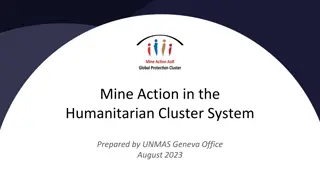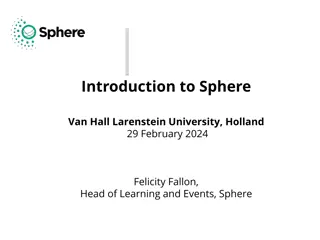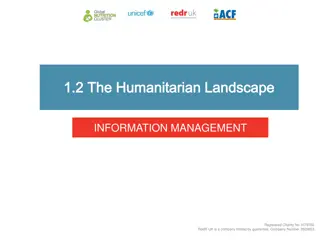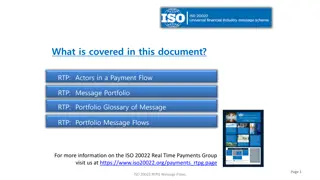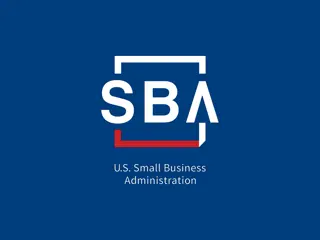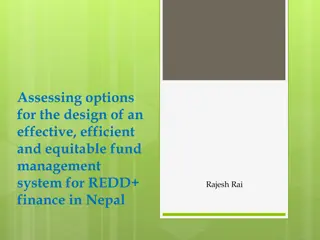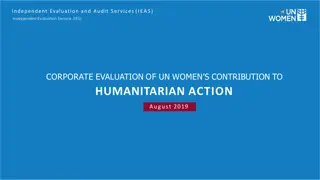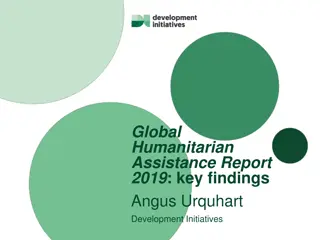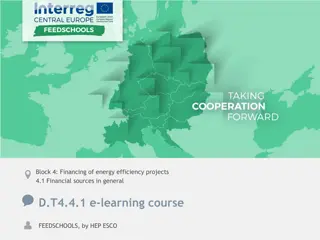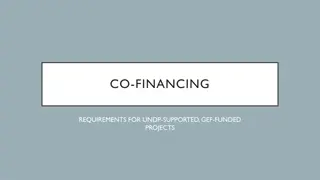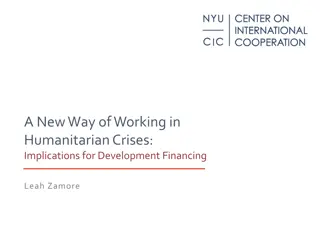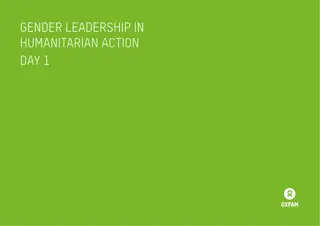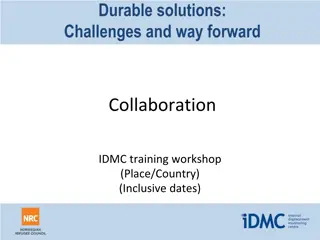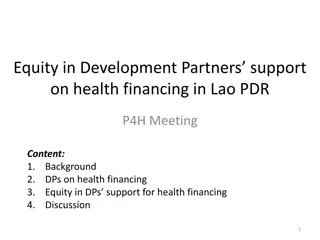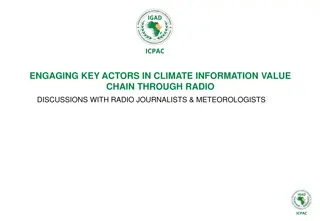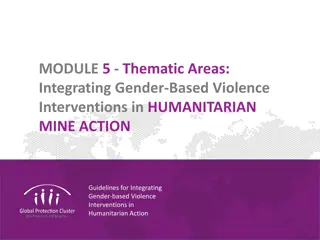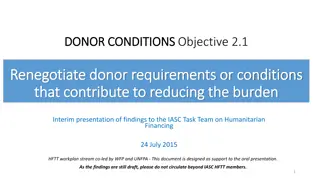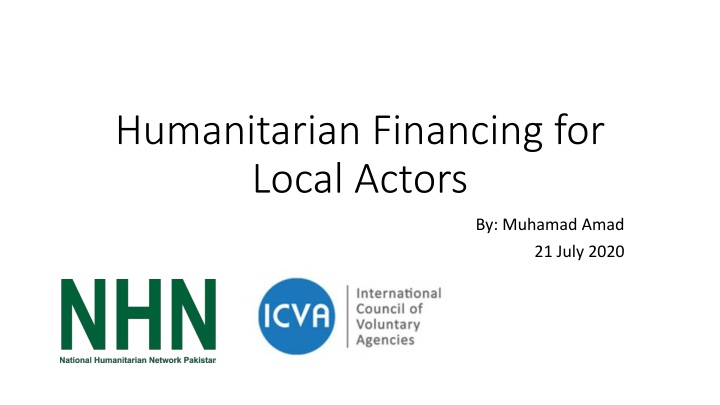
Humanitarian Financing Strategies for Local Actors - Insights by Muhamad Amad
Explore insightful strategies for humanitarian financing involving local actors, as advocated by development professional Muhamad Amad. Learn about the importance of localization, addressing compliance issues, and facilitating funding opportunities for women's rights organizations in humanitarian response efforts.
Download Presentation

Please find below an Image/Link to download the presentation.
The content on the website is provided AS IS for your information and personal use only. It may not be sold, licensed, or shared on other websites without obtaining consent from the author. If you encounter any issues during the download, it is possible that the publisher has removed the file from their server.
You are allowed to download the files provided on this website for personal or commercial use, subject to the condition that they are used lawfully. All files are the property of their respective owners.
The content on the website is provided AS IS for your information and personal use only. It may not be sold, licensed, or shared on other websites without obtaining consent from the author.
E N D
Presentation Transcript
Humanitarian Financing for Local Actors By: Muhamad Amad 21 July 2020
Presenter Mr. Mohammad Amad is a renowned development professional since 16 years. He had been a volunteer social worker in community since graduation and initiated social reform organization. He is an advocate of localization of humanitarian action. He is in the advisory board of Pakistan Humanitarian Pool fund and a regular contributor to UN strategic policies and plans. He is a member of realization team for START Hub in Pakistan. He contributed to the civil military protocols in complex emergency. Furthermore, he is endorsee of C4Cs and member of GNDR and PHAP. Since 8 years he is working as Executive Director of Initiative for Development and Empowerment Axis (IDEA) and since 3 years he is National Chair of NHN.
Definition Localization Local Actors Humanitarian Financing Grand Bargain -
Better Quality Financing for Local Actors Humanitarian Development Nexus Donors are encouraged to draw on lessons specifically around addressing compliance issues and administrative burden from the development context Many local civil society actors are both development and humanitarian actors, they are also encouraged to explore how project funding streams might be brought together to more flexibly support these two areas of work Ensuring funding opportunities for women s rights organizations and women-led organizations working on humanitarian response
Consortia Arrangements International actors should consider consortium arrangements with local actors, with joint reporting International actors are e encouraged to develop and/or expand rapid response fund facilities for local actor Local actors are also encouraged to consider consortia with each other Overhead/Indirect Allowances Donors and international actors should ensure that adequate overhead/indirect allowances are provided to local actors receiving funding for humanitarian project delivery There should be transparency on the criteria for and or the percentage of overhead/indirect funding for both international and local actors This should adequately cover costs of risk management and compliance requirements for both international and local actors (partners)
Organizational Strengthening & Sustainability Support by Internationals for Locals International actors project budgets for local actors should also include assets vital for project implementation, safety and/or organizational financial sustainability (e.g., laptops, vehicles, salaries for interim periods, insurance for staff and volunteers) and organizational strengthening (e.g., staff training, development of policies) These budgets should be transparent in showing what international partners receive to support the project (e.g., % admin fees) Local Actors Capacity &b Transparency Local actors should take the necessary steps to ensure their capacity to transparently and accountably manage and report on donated funds, requesting outside capacity strengthening support as needed They are encouraged to fully explore domestic resource mobilization opportunities including with the private sector in order to reduce reliance on international support
Move beyond Short-Term Project Funding towards Longer-Term Arrangements for Local Actors Donors and international actors are encouraged to move beyond short-term project funding for local actors towards longer-term arrangements that also include support for capacity strengthening, as needed, with an eye to future sustainability The viability of developing multiyear Humanitarian Response Plans should be analyzed as and when appropriate International partners receiving multi-year funding for humanitarian work in a particular setting should seek to pass along multi-year funding arrangements to their local partners.
Strengthening the impact of pooled funds for meeting localization goals Pooled funds, including the UN s Country-Based Pooled Funds(UN CBPFs), have a proven potential for supporting localization goals. In order to strengthen this potential, the following steps are recommended: 1. Ensure proactive outreach and effective communications with local actors, especially women-led/women rights organizations, including providing adequate application guidance in local languages 2. Consider budget flexibility as to the proportion of allowable staff costs, with an eye to organizational sustainability
Ensure that adequate indirect/overhead costs are passed on to local actors, including those acting as sub-grantees. UN CBPFs should continue to allow local actors to use up to 7% project support costs when they receive funding directly. In the case of sub grant arrangements, UN CBPFs should promote fair distribution of project support costs proportional to the budget or activity they implement Reserve a minimum number of seats for local actors in advisory boards, strategic review committees and strategic advisory groups Encourage local actors to design/co-design funding proposals around strategic humanitarian needs in a specific crisis rather than ad hoc funding proposals Take a long-term perspective and include exit strategies, in targeting and programming as and when appropriate
Managing and sharing risks Common Assessment Review Process for Local Actors Donors and international actors are encouraged to develop a common assessment review process for local actors at the country level, including, at minimum, arrangements for assessments conducted by one of them to be accepted by as many others as possible This may include a tiered due diligence model related to various levels of support and or framework for strengthening compliance and quality assurance.
Regular Conversation about Fiduciary Risks Donors, international actors and local actors are encouraged to hold regular conversations at the country level about how fiduciary risks are being managed and shared with regard to humanitarian funding, without neglecting other risks such as security, compliance, quality assurance and reputational risks Management risk in all of its dimensions should be embedded in the programme design, implementation and reporting Examine Legal or Policy Barriers for International Funding Donor and affected state governments are encouraged to examine legal or policy barriers that may hamper international funding for local humanitarian responders (such as rules on the impact of sanctions on banking, counter-terrorism, nationality preferences for receipt of funds, and currency rules and regulations) with an eye to potential exceptions or reforms
Greater Flexibility for Local Actors Donors and international actors are encouraged to explore greater flexibility in terms of reporting requirements for local actors (e.g., more flexible deadlines, simplifying language in proposals and reporting templates, potentially through use of the Grand Bargain Reporting Workstream s 8+3 reporting template). Disclaimer Disclaimer: Presentation is prepared from the Guidance note on humanitarian financing for local actors that is developed on best practices identified in consultations in three regional conferences on localization conducted by the Grand Bargain Localization Work stream in 2019, as well as from a research project commissioned by the IFRC with support from ECHO. This guidance note is a product of the Grand Bargain Localization Work stream but does not necessarily represent the official position of work stream members and Co-Conveners

